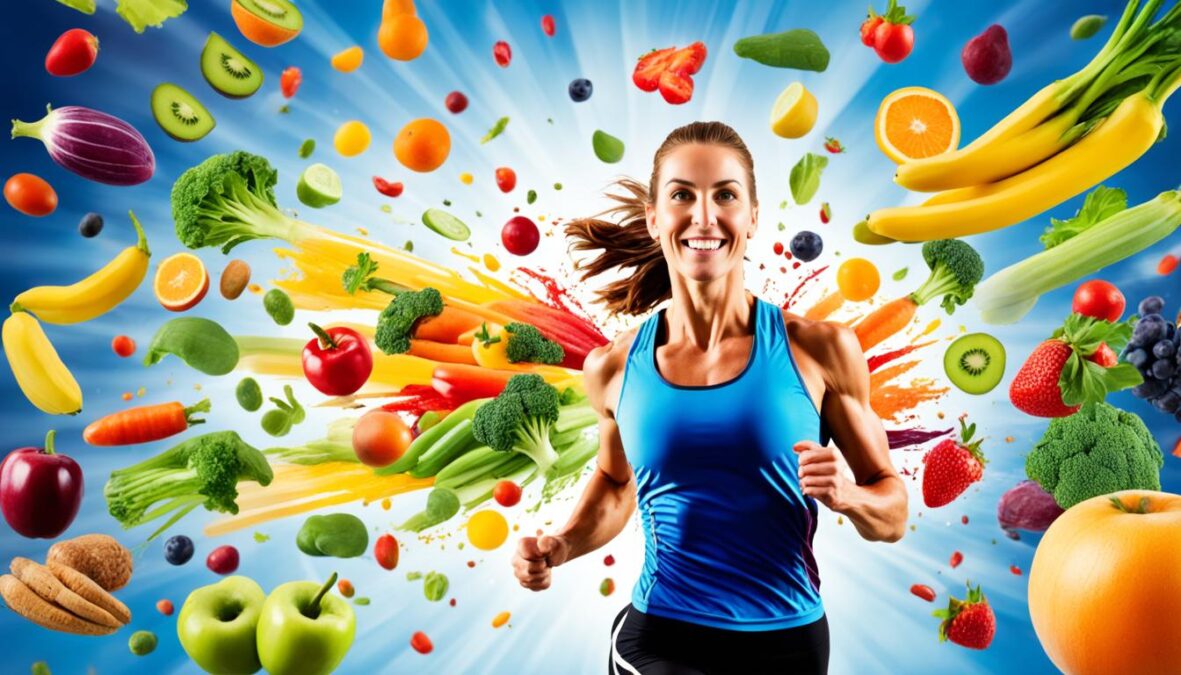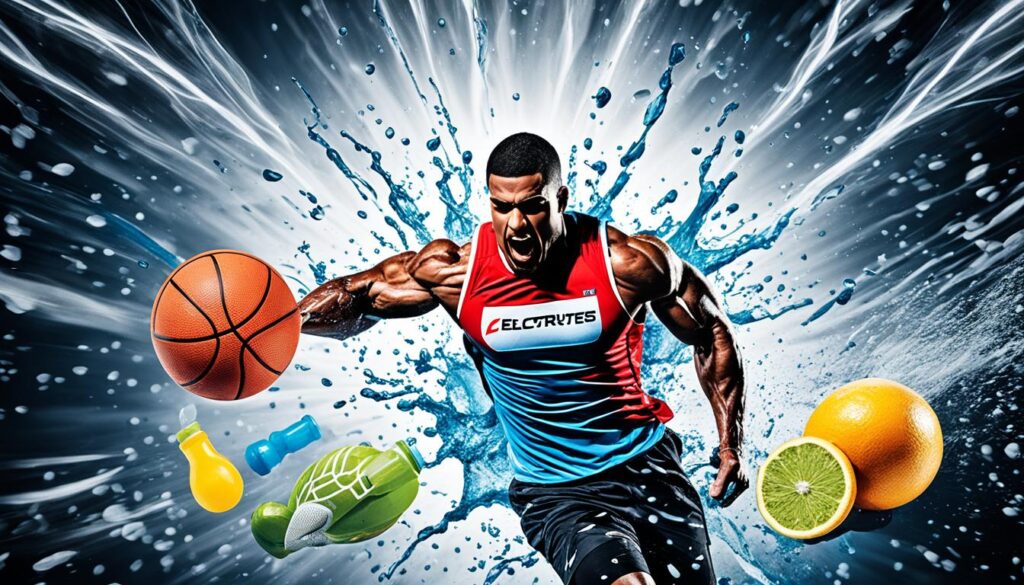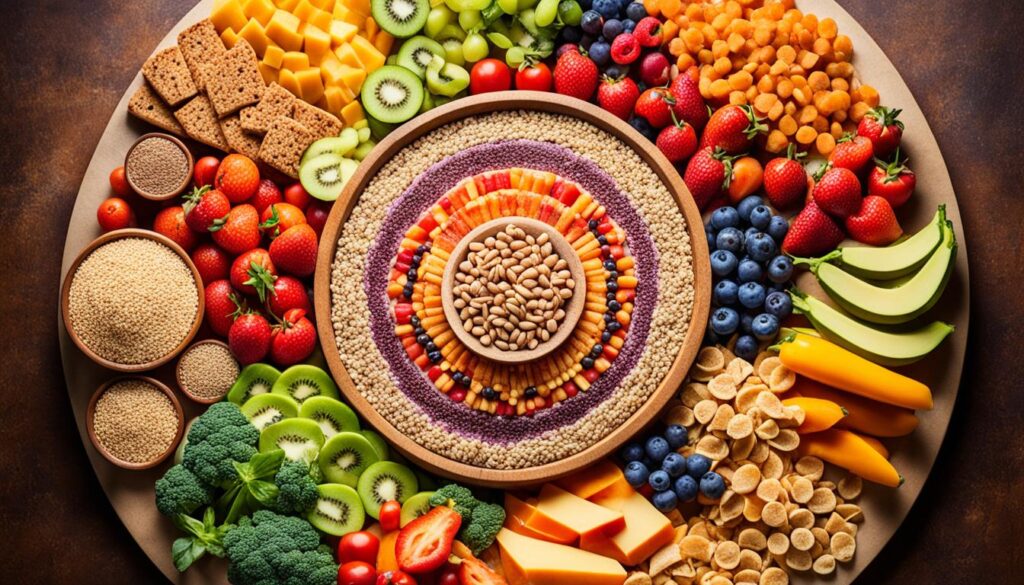Are you an athlete looking to go beyond your limits? The key to unleashing your true potential might just be in the world of sports nutrition. The right fuel and staying hydrated can significantly boost your energy, cut down on muscle tiredness, and improve how well you perform. Learn how sports nutrition’s science can help you reach your highest aims.
Sports nutrition is all about using food to ramp up your athletic game. Eating the proper nutrients is a must for maximizing your performance. It involves knowing the ideal foods, timing, and amounts for eating and drinking around your workouts or competitions. The right sports nutrition tricks can keep your energy up, lower muscle tiredness, speed up healing, and better your overall sports performance to help you reach your targets.1
Key Takeaways
- Sports nutrition is crucial for fueling athletic performance and enhancing recovery
- Proper macronutrient balance, hydration, and nutrient timing are key to optimizing performance
- Personalized sports nutrition plans can help athletes achieve their unique goals
- Emphasis on whole, nutrient-dense foods over highly processed options is recommended
- Electrolytes, vitamins, and minerals play vital roles in athletic function and health
The Importance of Sports Nutrition
Having the right sports nutrition is key for athletes to perform at their best. It gives them energy to power through hard workouts. It also helps them avoid getting tired easily.
Reduce Muscle Fatigue and Improve Recovery
Good sports nutrition is crucial for athletes’ muscle recovery between practices. This helps them come back stronger and less likely to get hurt.2
Enhance Performance and Achieve Your Goals
With the right sports nutrition, athletes can boost their performance and reach their athletic goals.23
Drinking enough and eating the right macronutrients is vital. It fuels their bodies and helps them perform better.23
Athletes should also pay attention to their nutrient intake. They need to get enough vitamins and minerals for their health and recovery.23
With the right sports nutrition, athletes can improve both physically and mentally. They can lower their injury risk too. And, they can successfully meet their performance objectives.23
Weight Management for Athletes
For athletes, managing weight is key in their nutrition plans. They aim to keep their bodies in the best shape. This involves finding the right mix of how much food they need and how they burn it.
Eating the right foods helps them reach their sports goals. Athletes might need to adjust their food to gain or lose weight. Getting this balance right can boost how well they perform, cut down on injuries, and make recovery quicker. Athletes need to be smart about what they eat and how they burn it off, ensuring they stay healthy.
Optimizing Body Composition
Many active people worry about their weight, even if they seem fine by the scale.4 Some athletes might not have much body fat but might still want to slim down to do better in their sport or just to look a certain way.4 The right way for athletes to manage their weight should not lead to unhealthy eating habits or missing out on important nutrients. This approach should still let them perform at their best.
Balancing Food Intake and Energy Expenditure
When trying to lose weight, it’s important to eat plenty of protein to keep muscles strong. Aim for 1.2-1.7 grams of protein for every kilogram you weigh each day.4 Losing weight takes more than eating fewer calories than you use, it’s not that simple.4 For kids, managing weight is about eating well and staying active, not just cutting calories, to avoid being overweight or obese.4
Hydration Strategies for Athletes
Staying hydrated is key for athletes. It’s vital for performing well and for recovering quickly. Athletes should drink plenty of water before, during, and after their activities. This keeps their body in balance and reduces the risk of dehydration, which hurts both their physical and thinking abilities.5
The Importance of Staying Hydrated
During sports, athletes might lose 2 quarts of water every hour. For long runs, it can be up to 3 quarts.6 Dehydration lowers their skill level, endurance, and focus. It can also affect their breathing and mood.6 Since water makes up about 60% of our body weight, staying hydrated is crucial for athletes. Just a 2% loss in body weight can harm an athlete’s performance.5
Water vs. Sports Drinks
Water is the top choice for most people, but sports drinks can help, too. They give athletes energy and replace lost electrolytes during intense or long events.6 A sports drink with 6-8% carbohydrates helps the muscles and boosts performance.5 For endurance activities over three hours, choose a sports drink with proper carbohydrates and at least 110 mg of sodium per serving. This helps with staying hydrated.5
Factors Affecting Hydration Needs
Hydration needs change based on the weather, how hard you’re working out, and how much you sweat. A plan tailored to the individual is essential.6 Teens tend to sweat more than kids, especially after they hit puberty.6 For energy, adults should look for 6% to 8% carbs in sports drinks.6 Drink 6 to 12 ounces of fluid every 20 minutes when playing sports, and this goes for adults.6
Before an event, athletes should have 24 ounces of a sports drink or electrolyte water.6 In activities longer than 45 minutes for adults or an hour for kids, go for a sports drink, not just water.6 After, rehydrate with 16–24 ounces of water or a hypotonic sports drink, aiming to recover 24 ounces for every pound lost.6 Using a water bottle marked with time reminders can help keep track of how much you’ve drunk throughout the day.6
| Hydration Recommendations | Details |
|---|---|
| Pre-Activity Hydration | Consume 24 ounces of sports drink or electrolyte-infused water 2 hours before exercise6 |
| During Activity Hydration | Drink 6-12 ounces of liquid every 20 minutes during sports play6 |
| Post-Activity Hydration | Drink 16-24 ounces of water or hypotonic sports drink, aiming for 24 ounces per pound lost6 |
| Sports Drink Composition | 6-8% carbohydrates, at least 110 mg sodium per 8-ounce serving5 |
Electrolytes, Vitamins, and Minerals
Essential for health and sports, electrolytes, vitamins, and minerals are vital.7 Our body relies on electrolytes like Sodium, Potassium, Calcium, and more. They help muscles work right and keep our fluids balanced.7 Meanwhile, vitamins and minerals aid in many bodily functions. They help with energy, immunity, and more.
Role of Electrolytes in Muscle Function
7 Not getting enough Sodium might lead to dehydration or even coma.7 Low Potassium can cause an irregular heartbeat or muscle weakness.7 And without Magnesium, you might feel very tired, or get muscle cramps.7 A lack of Calcium could bring muscle cramps or confusion.7 Also, Phosphorous is needed to keep bones strong. Without it, you might feel weak or not hungry.
Essential Vitamins and Minerals for Athletes
8 Since the early 1990s, we’ve researched how vitamins and minerals benefit athletes.8 Women who are athletes often lack important vitamins and minerals. This can affect their health and performance.8 Athletes sometimes don’t get enough iron. Doctors look into different ways to give them extra iron.8 Providing iron to those who need it can ease fatigue and improve physical ability, even if they’re not anemic.
8 Vitamin D benefits athletes with spinal cord injuries, improving their performance.8 Elite athletes often lack enough vitamin D. It’s crucial for top performance.8 Calcium is key for strong bones. It’s shown that eating foods rich in calcium helps bone health.
Supplementation and Diet
Many nutrients for athletes come from their diet. But sometimes, taking extra vitamins is needed, especially for those with special dietary needs.7 Foods like bananas and salmon are great for electrolytes. Doctors check electrolyte levels with blood tests. They watch for symptoms like weakenss.
7 After intense exercise or illness, you might need fluids with extra electrolytes.7 While sports drinks work, foods that naturally contain electrolytes are better. Milk and coconut water are great daily choices.7 For the elderly, snacks or drinks with low sugar are advised. Your doctor can recommend the best options for you.7 Water isn’t enough to replace lost electrolytes. Eating the right foods and drinks is crucial.
8 The Female Athlete Triad has advanced to RED-S, a view that considers nutrition, energy, and performance. This new understanding is important in sports.
Protein and Amino Acids
For athletes, protein is key for muscle growth and repair. The body uses 20 amino acids from proteins for many roles, including muscle building and support.9 The International Society of Sports Nutrition (ISSN) said in 2017 that athletes need high-quality protein. They should get it from food or supplements like protein powders. This helps them build muscle, have energy for workouts, and stay healthy.9
Muscle Growth and Repair
Eating enough protein is vital for athletes’ muscle needs.9 A 2018 study showed whey protein can help muscles recover faster after workouts.9 It also said whey protein helps more than micellar casein in older men.9 It’s important to get protein at the right times to boost muscle recovery and growth.
Energy Metabolism
The amino acids in proteins are crucial for a good .9 A 2020 study looked at whole eggs and egg whites’ effects on muscle markers during resistance training. It showed using whole eggs is better for athletes.9 This finding means athletes should have enough complete proteins to power their workouts and meet their body’s energy demands.
Brain Health
Protein supports muscles and energy, but it’s also great for the brain.9 The Food and Agriculture Organization in 2013 stressed the need for a diverse diet. It should include top-quality protein sources for overall health, especially brain wellness.9
Athletes who focus on protein can boost their performance, recovery, and health.
Carbohydrates and Energy
Carbs are athletes’ main energy source, helping muscles work hard.10 For those training long hours, they might need over 12 grams per kilo daily. This means a lot of carbs to keep them going strong.10 For moderate exercise, 5 to 7 grams per kilo is enough. But for harder workouts, they might need 8 or more grams per kilo daily.10
Fueling Muscles for Exercise
Getting the right carbs is key for muscle fuel.10 Many athletes don’t eat enough, which can hurt their performance.10 Eating carbs before and during exercise helps you go longer and harder.10 After workouts, quick carbs like fruits can help your muscles recover faster.10
Types of Carbohydrates
Carbs come in many forms, from simple sugars to complex starches.11 Athletes need different amounts based on their routine.11 A simple way to know how much to eat is by looking at your weight and training.11
Timing of Carbohydrate Intake
Eating the right carbs before and after working out is vital.11 Your pre-exercise meal should be around 3-4 grams per kilo and eaten 3-4 hours before you start.11 About 1.5 grams per pound four hours prior, and 0.5 grams an hour before, is also good.11 Some good foods are dried mango, granola bars, and fruit smoothies.11
For quick energy, choose liquid carbs like sports drinks.11 But for longer-lasting fuel, pick snacks with some protein, like granola bars with jerky.11 Drinking sports drinks with carbs during long workouts also helps.11
Fats and Their Role
During exercise, carbs are key, but fats are vital too. Essential fatty acids like omega-3s are critical. They help with energy, hormones, and the immune system.12
Essential Fatty Acids
Omega-3s from fish are great for athletes. They cut down on swelling, boost healing, and make your brain work better. Adding omega-3s to meals helps athletes perform better and feel good overall.
Healthy Fat Sources
Healthy fats from nuts, seeds, avocados, and fish offer long-lasting energy. They speed up recovery and help with the body’s work. Adding these fats to their meals lets athletes meet their energy and hormone needs.
It’s crucial to balance when and how much fat an athlete eats. Choosing healthy fats helps athletes power up and recover well.
sports nutrition Plans
Creating a solid sports nutrition plan is crucial for athletes. It helps them perform better and recover faster. The right plan looks at the athlete’s goals, their training, and what their body needs. It’s important to get the correct amount of carbs, protein, and fats. Aim for about 45-65% carbs, 15-25% protein, and 20-35% fats13.
Macronutrient Ratios
Aim to eat 0.7-1.0 grams of protein for every pound of body weight each day13. It’s also good to have meals with 20-40 grams of protein every 3-4 hours. This is especially true within 2 hours after hard workouts. It helps your muscles recover and grow13.
Timing and Nutrient Periodization
Eating the right foods at the right time before and after workouts is key. It helps your muscles get the energy they need and recover well. After working out, try to eat 30-60 grams of simple carbs within 30 minutes13. This refills your energy stores fast.
Also, changing what you eat and when you eat it during your training cycle can improve how you look and perform.
FAQ
What is sports nutrition?
Sports nutrition is the science of eating to boost your athletic performance. It’s about getting the right nutrients. This helps athletes do their best in their sport.
How can proper sports nutrition enhance athletic performance?
Good sports nutrition keeps energy levels up and lessens muscle tiredness. It also speeds up recovery. All of this helps athletes perform better and achieve their goals.
Why is weight management important for athletes?
Managing weight well means better performance and lower injury risk. It also helps with quicker recovery. Athletes should watch what they eat to make sure they get enough without overdoing it.
What is the importance of hydration for athletes?
Staying hydrated is crucial for athletes before, during, and after they exercise. It keeps their body’s balance right. Dehydration hurts how well they can move and think.
How do electrolytes, vitamins, and minerals support athletic performance?
These nutrients are key for athletic performance and health. Electrolytes help muscles work right. Vitamins and minerals do a lot for the body, like help with energy and keep the immune system strong.
Why is protein important for athletes?
Protein is vital for athletes because it helps grow, repair, and recover muscles. It’s needed to stay strong and do well in sports. High-quality protein is a must for athletes.
What is the role of carbohydrates in athletic performance?
Carbs give athletes the energy they need during their sports or workouts. They help muscles keep working hard. Eating carbs the right way can boost an athlete’s energy and endurance.
How do fats contribute to athletic performance and recovery?
Fats are essential for overall health and play a part in sports too. They help with important body functions like making energy and controlling hormones. Fatty acids, especially omega-3s, are important for athletes.
How can a comprehensive sports nutrition plan benefit athletes?
Having a detailed nutrition plan helps athletes perform and recover better. It should fit their specific needs and goals. This includes the right balance of nutrients and timing meals right to support their body during training and competitions.
Source Links
- https://www.uwhealth.org/news/eating-for-peak-athletic-performance
- https://www.ncbi.nlm.nih.gov/pmc/articles/PMC3805623/
- https://atp.uidaho.edu/blog/enhancing-athletic-performance-the-science-behind-sport-nutrition/
- http://www.gssiweb.org/sports-science-exchange/article/weight-management-for-athletes-and-active-individuals
- https://www.usada.org/athletes/substances/nutrition/fluids-and-hydration/
- https://www.hopkinsmedicine.org/health/wellness-and-prevention/nutrition-and-fitness/sports-and-hydration-for-athletes
- https://www.webmd.com/diet/foods-high-in-electrolytes
- https://www.ncbi.nlm.nih.gov/pmc/articles/PMC10721676/
- https://www.ncbi.nlm.nih.gov/pmc/articles/PMC9247391/
- https://www.ncbi.nlm.nih.gov/pmc/articles/PMC5794245/
- https://www.usada.org/athletes/substances/nutrition/carbohydrates-the-master-fuel/
- https://www.usada.org/athletes/substances/nutrition/fat/
- https://www.healthline.com/nutrition/sports-nutrition



